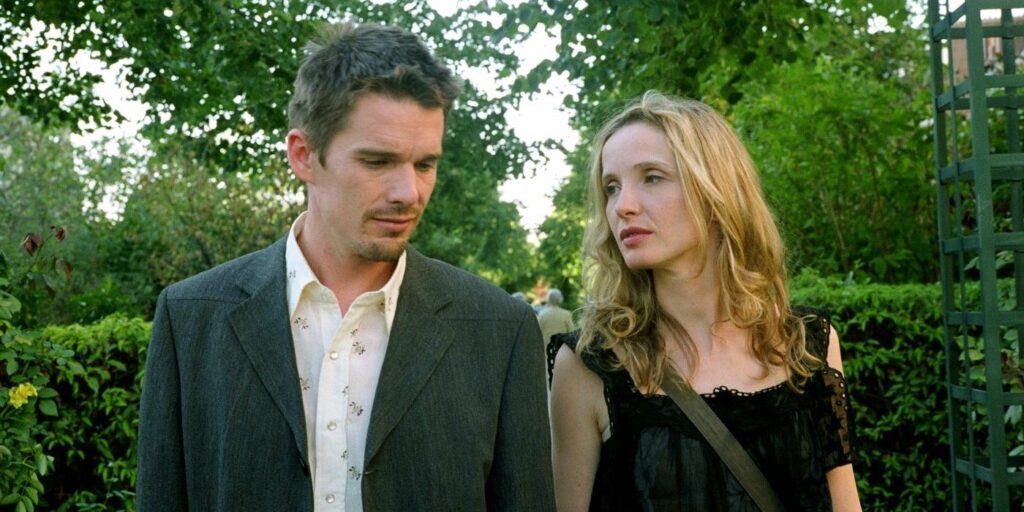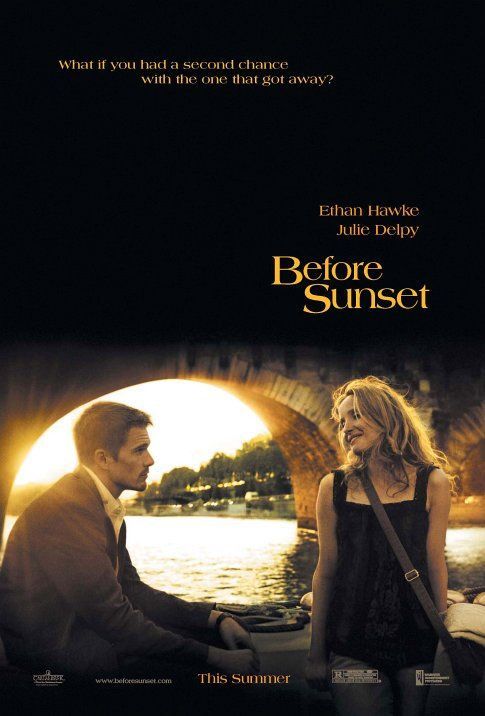Richard Linklater is among the most singular filmmakers of the fashionable period, as he’s the uncommon author/director who can seize the profundity of actual life. Whereas there are various makes an attempt to make “slice of life” tales inside impartial cinema, Linklater can discover the pure magnificence in universally relatable experiences and create characters who really feel fully genuine. Though Linklater has many classics on his resume, probably the most defining venture of his career may be the trilogy of Earlier than Dawn, Before Sunset, and Earlier than Midnight, which facilities on the decades-spanning romance between the American Jesse (Ethan Hawke) and the French Céline (Julie Delpy). Delpy offers probably the most emotionally complicated efficiency in any Linklater movie in Earlier than Sundown, as it’s a sequel that defies all conventions.
Julie Delpy Is at Her Greatest in ‘Earlier than Sundown’
The prospect of a sequel to Earlier than Dawn appeared unlikely, as the primary installment in Linklater’s attractive trilogy had completely captured the essence of what it’s wish to fall in love with somebody for the primary time. Earlier than Sundown is a much more complicated movie, because it questions whether or not it’s potential to retain the same enthusiasm about romance as soon as youthful idealism has light away. Delpy is confronted with larger emotional baggage in Earlier than Sundown, as Céline is confronted with the guilt that she felt about not assembly Jesse after their preliminary encounter in Earlier than Dawn; whereas she doesn’t need to admit something which may make him really feel regretful about his selections, she additionally understands that she might be ready to interrupt up his marriage. Céline additionally feels considerably insecure round Jesse, as he has discovered nice success as an creator and seems to be very completed.
Associated
Could There Be a Fourth Film in Richard Linklater’s ‘Before’ Franchise?
“We’ll do it when it is sensible.”
Delpy needed to make a dramatic evolution in her depiction of Céline, as she has radically modified since her look in Earlier than Dawn. Whereas the primary movie depicted her as a considerably cynical, irreverent character who didn’t consider in the identical idealistic understanding of romance that Jesse did. In Earlier than Sundown, she begins to marvel if this was unwise, as she is continually compelled to think about what her life would have been like had she stayed with Jesse 9 years prior, and whether or not it’s potential to rekindle her romance. Whereas Jesse has had life experiences in between the movies which have made him extra mature, Céline considers whether or not it might be willfully ignorant to fake that they’d be capable to begin their relationship proper the place it left off. It’s an incredible feat of performing on Delpy’s half as a result of, regardless of the regularly intelligent dialogue that she delivers, loads of her efficiency is reliant on subtle facial expressions and physical alterations.
Céline Is the Coronary heart of ‘Earlier than Sundown’
Linklater has typically made his collaborators a part of his inventive course of, and each Delpy and Hawke had been capable of contribute to the screenplay of Earlier than Sundown, which earned them an Academy Award nomination for Greatest Tailored Screenplay. Though Hawke’s efficiency is extraordinarily charismatic, Delpy is saddled with taking part in a personality who shouldn’t be at all times as likable; a lot of the movie is spent attempting to persuade each Jesse and the viewers to not hate Céline for the choices that she made. It was courageous of Delpy to tackle a task that was so complicated, particularly given the reward that Earlier than Dawn had already earned for its simplicity. Nevertheless, the issues that Earlier than Dawn added to Céline felt like a extra genuine manner of increasing the character, and set up a brilliant conclusion to her marriage with Jesse in Earlier than Midnight.
Earlier than Sundown is the very best installment within the trilogy, because it doesn’t have a pure beginning or ending level in the identical manner that the opposite two movies do; it’s not a coincidence that the emotional crux falls upon Delpy, as it’s Céline’s delicate seduction of Jesse that builds the strain. Essentially the most memorable installment in your entire trilogy includes Céline suggesting to Jesse that he shouldn’t miss his flight, regardless of it being apparent that she feels the alternative. The truth that Delpy was capable of brilliantly convey her character’s contradictory feelings, crafting one of the vital beautifully ambiguous movie conclusions of all time, is a testomony to the brilliance of her efficiency.



